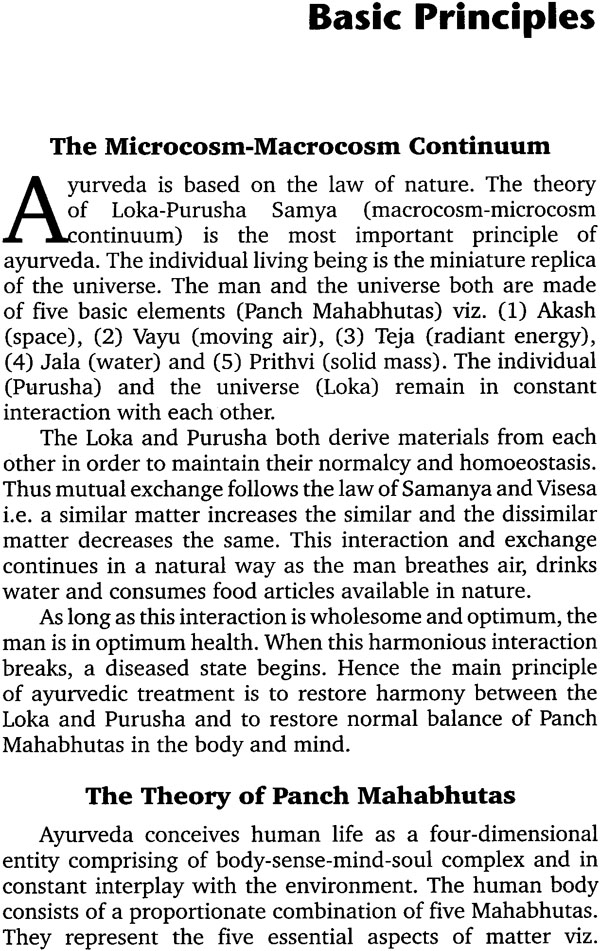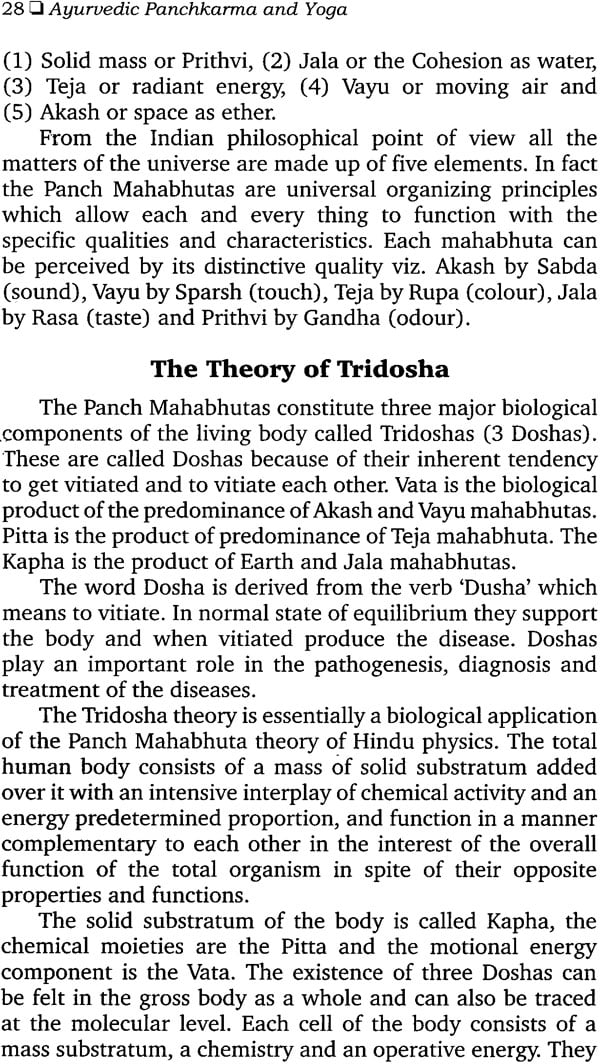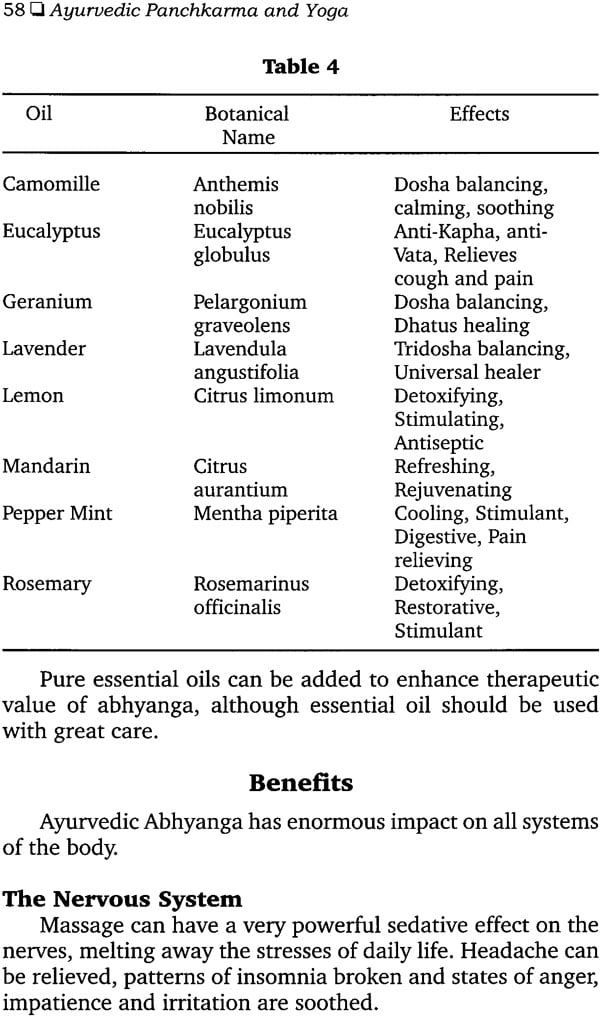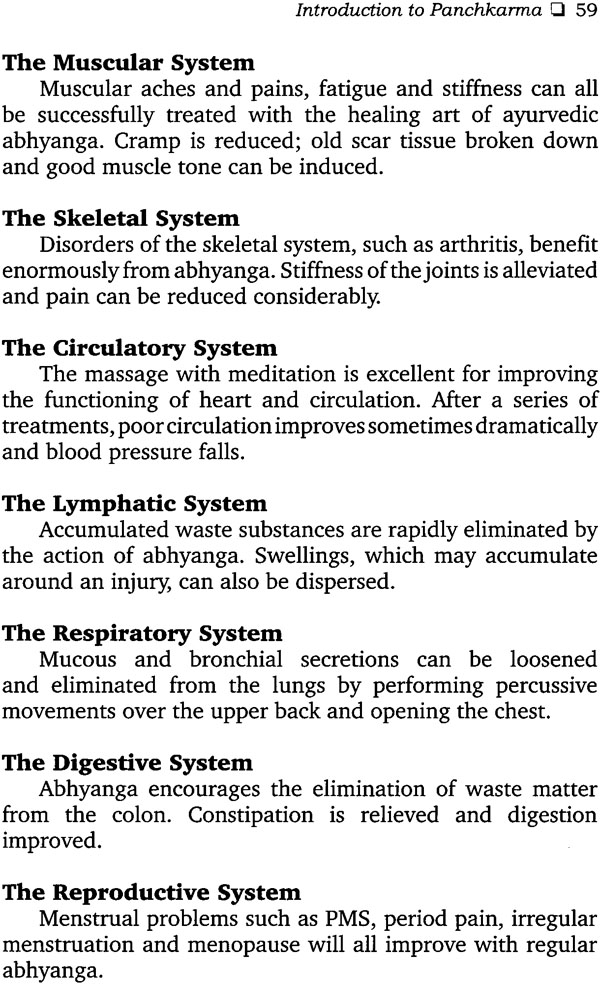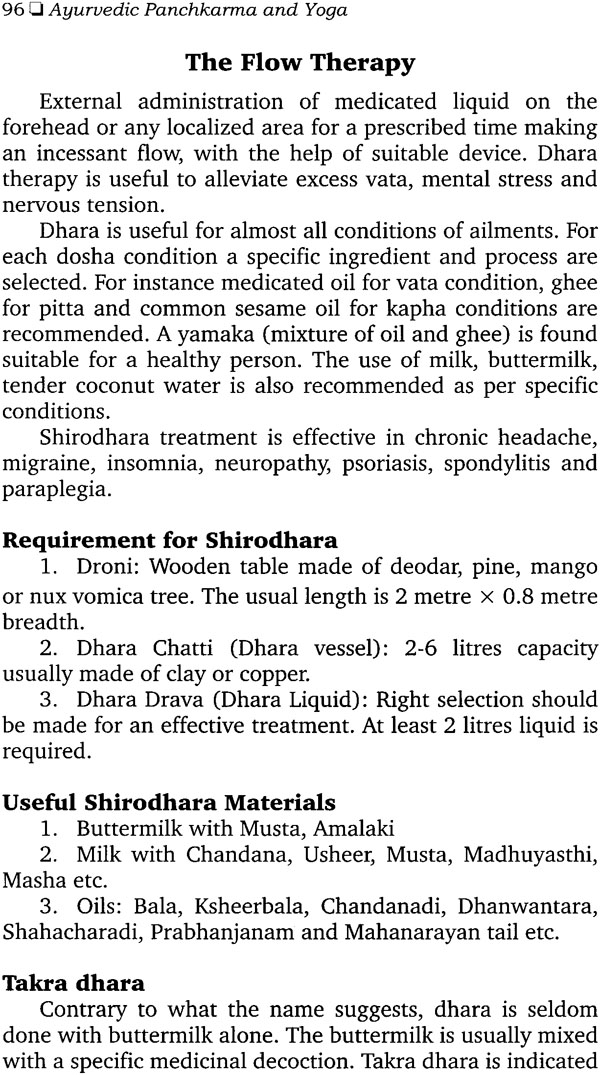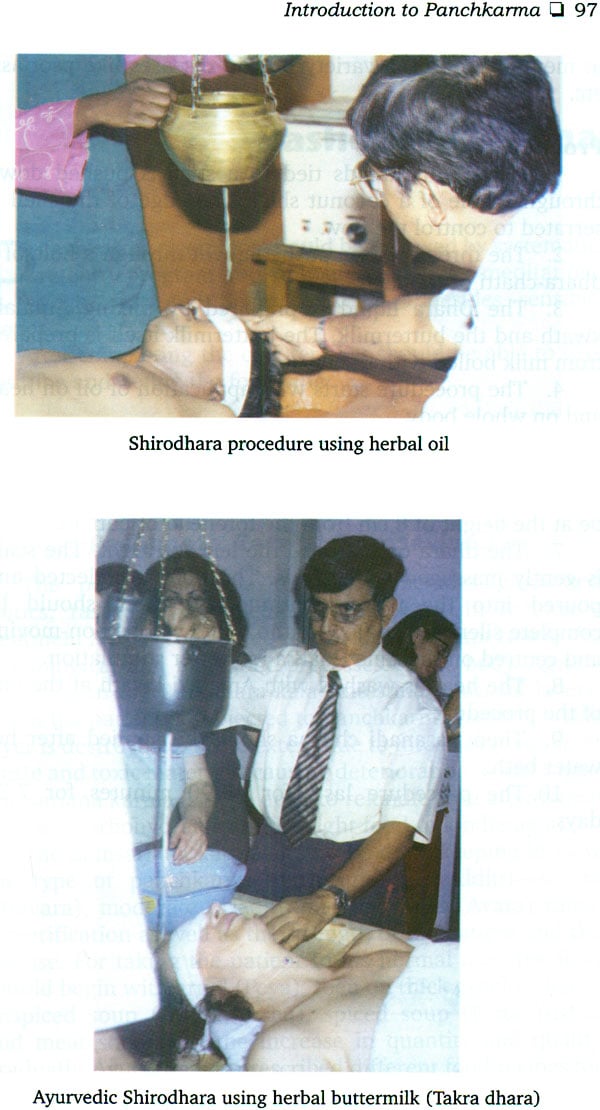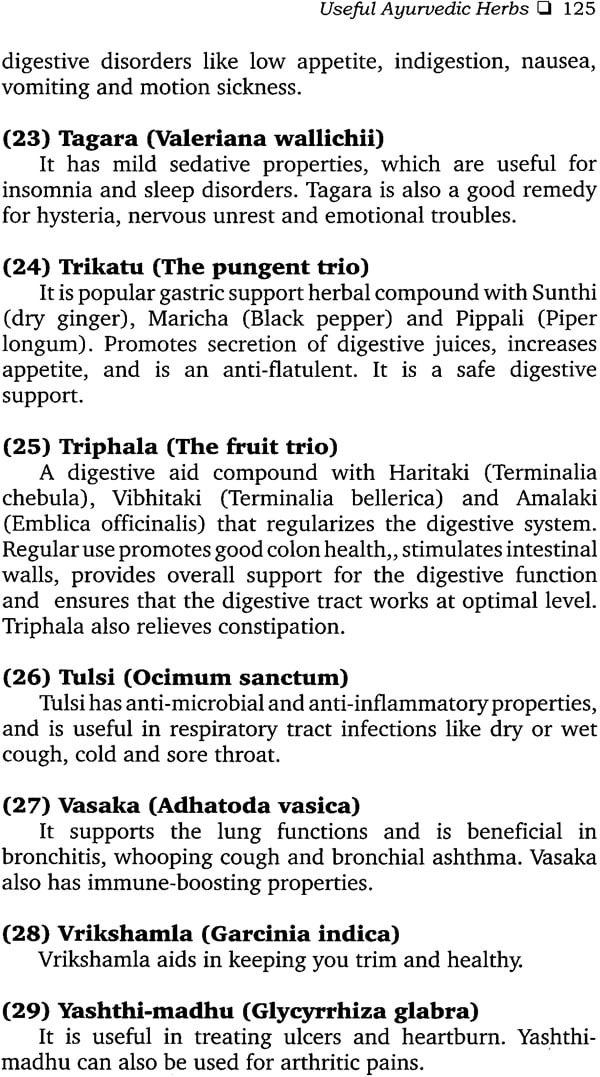
Ayurvedic Panchkarma and Yoga
Book Specification
| Item Code: | NAM790 |
| Author: | Dr. Mukesh D. Jain |
| Publisher: | Abhinav Publication |
| Language: | English |
| Edition: | 2015 |
| ISBN: | 9788170174530 |
| Pages: | 138 (10 Color and 1 B/W Illustrations) |
| Cover: | Hardcover |
| Other Details | 9.0 inch X 5.5 inch |
| Weight | 340 gm |
Book Description
Panchkarma is Ayurveda's most popular therapy. The present book is based on the author's 30 years of clinical practice with this unique treatment modality to eliminate the subtle itiated Doshas from the body cells. It aims at explaining the variouscleansing and rejuvenating processes of Panchkarma in a simple manner. The author is a practising Ayurvedic physician since 1981 and specializing in the P{anchkarma and Rasayana treatment of chronic diseases. He demonstrates in meticulous detail the unique treatment agenda for several serious ailments such as ageing, overweight and hyperlipidemia, muscular dystrophy, psoriasis, rheumatoid arthritis, hypertensive heart attack, cervical spondylitis, low back pain, migraine and parkinson's disease.
Ayurvedic treatments described in this book are especially effective in relieving stress and immunity-related conditions, chronic pain, metabolic disorders and diseases of neuro-muscular system.
Dr. Jain is an internationally known practitioner of Ayurvedic medicine specializing in neuro-muscular and neuro-degenerative diseases, using evidence-based, safe and affordable Ayurvedic treatment. Hehas practised Ayurvedic healing since 1981 and is a well-known physician, researcher, and speaker at international conferences. He has taught Ayurveda at Government Medical College, Raipur and Central Medical Institute, Bhilai. He is a regular contributor to Ayurvedic journals and magazines and has authored three books on Ayurveda and Yoga therapy. Dr. Jain is a graduate of the Pundit Ravi Shankar University. Raipur and now lives in Bhilai, India with his wife Anjali, a specialist in Ayurvedic skin treatments.
Our society is suffering from preventable complex diseases. Despite amazing diagnostic tools and powerful pharmaceuticals, serious neuro-muscular diseases like muscular dystrophies, motor neurone disease, Parkinson's disease, rheumatoid arthritis, spondylitis, hypothyroidism, psoriasis, skin-sex and sleep disorders, migraine, epilepsy, hypertension and even diabetes are posing serious health problems to the patients and physicians.
In this context ayurvedic Panchkarma treatments have captured the attention and imagination of modern medical scientists and health professionals. Panch karna are five unique, original, time-tested approaches of human treatment. This ayurvedic speciality is useful for promotion of health, prevention and cure of diseases. Panch karma is also useful in the management and rehabilitation of so-called uncontrolled diseases of modern age.
Ayurveda believes that human diseases are unlimited How many afflictions have been in the past and how many will evolve in the future, there is no definite answer. The number of human diseases may be indefinite, but their treatment can be simple. We can fight and win serious complex diseases by focusing our attention on primary cause of disease.
Disease according to Ayurveda is caused by dysregulation and depletion of vata and agni elements. Our immune system is dependent on integrity of tridoshas viz. vata-pitta-kapha. The body's natural immune system plays a major role in preventing even serious diseases like cancer and AIDS.
The factors that cause the degeneration of immune system are many, a primary one being depletion and dysregulation of vata and agni elements. This basic pathology can be corrected by ayurvedic panchkarma, rasayana, special diet and support of Panch yoga (Yama-Niyama-Asana-Pranayama-Dhyana).
Ayurveda is reborn again in modern time because people are suffering from complex, diseases and are fed up with the side-effects and high cost of modern treatments. Ayurvedic Panchkarma is becoming popular in many countries as a new path of healing and mantra for rejuvenation. The oil therapies of Panchkarma are scientifically verified for their effectiveness in the simple management of serious neurological disorders. The purificatory therapies of Basti, Nasya, Virechana and Vamana have been proved to correct the metabolic disorders. Ayurvedic Panchkarma and rasayana treatment is also effective in the management of genetic degenerative disorders like muscular dystrophies and motor neurone diseases.
| Preface | 21 | |
| 1 | Ayurveda and Its Approach to Health | 23-25 |
| 2 | Basic Principles | 27-40 |
| The Microcosm-Macrocosm Continuum | 27 | |
| The Theory of Panch Mahabhutas | 27 | |
| The Theory of Tridosha | 28 | |
| The Dosha Prakriti | 29 | |
| The Trigunas | 29 | |
| The Theory of Swabhaoparamavada | 30 | |
| The cause of Disease | 30 | |
| The Disease Process | 30 | |
| The Concept of Agni and Ama | 31 | |
| The Ayurvedic Diagnosis | 32 | |
| The Rogi Rariksha | 32 | |
| The Roga Parikasha | 32 | |
| The Ayurvedic Treatment | 33 | |
| The Ancient Concept of Vata | 34 | |
| The Assessment of Human Prakriti | 37 | |
| 3 | The Nadi Pariksha | 41-44 |
| 4 | Introduction to Panchkarma | 45-102 |
| Abhyanga (Ayurvedic Massage) | 55 | |
| Swedana (Ayurvedic Formentation | 61 | |
| Kerala Special Treatment | 65 | |
| Vamana Karma | 71 | |
| Virechana Karma | 77 | |
| Basti (Ayurvedic Enemas) | 83 | |
| Nasya Karma (Nasal Therapy) | 91 | |
| Dhara (Flow Therapy) | 95 | |
| Pashchata Karma (Aftercare) | 99 | |
| 5 | Treatment of Complex Diseases | 103-119 |
| Rasayana (Anti-ageing Treatment) | 103 | |
| Overweight and Hyperlipidemia | 105 | |
| Muscular Dystrophy | 107 | |
| Psoriasis | 108 | |
| Rheumatoid Arthritis | 110 | |
| Hypertensive Heart Attack | 112 | |
| Cervical Spondylitis | 114 | |
| Low Back Pain | 115 | |
| Migraine | 117 | |
| Parkinson's Disease | 118 | |
| 6 | Useful Ayurvedic Herbs | 121-126 |
| Amalaki (Emblica officinalis): Anti-oxidant | 122 | |
| Arjuna (Terminalia arjuna): Blood circulation | 122 | |
| Ashwagandha (Withania somnifera): Anti-stress | 122 | |
| Bael (Aegle marmelos): Anti-diarrhoeal | 122 | |
| Brahmi (Bacopa monnieri): Alertness | 122 | |
| Gokshura (Tribulus terrestris): Effective kidney function | 122 | |
| Guduchi (Tinospora cordifolia): Immunomodulator | 123 | |
| Haridra (Curcuma longa): Anti-allergy | 123 | |
| Haritaki (Terminalia chebula): Colon cleanser | 123 | |
| Kapikachhu (Mucuna pruiens): Nervine tonic | 123 | |
| Karela (Momordica charantia): Regulates Metabolism | 123 | |
| Lasuna (Allium Sativum): Cholesterol protection | 123 | |
| Mandukaparni (Centella asiatica): Alertness | 123 | |
| Manjishtha (Rubia cordifolia): Diuretic | 123 | |
| Meshashringi (Gymnema sylvestre): Sugar destroyer | 124 | |
| Neem (Azadirachta indica): Skin care | 124 | |
| Punarnava (Boerhaavia diffusa): Urinary support | 124 | |
| Shallaki (Boswellia serrata): Joint pain | 124 | |
| Shatavari (Asparagus racemosus): Female tonic | 124 | |
| Shigru (Moringa pterygosperma): Anti-inflammatory | 124 | |
| Guggulu (Commiphora mukul): Cholesterol regular | 124 | |
| Sunthi (Zingiber officinalis): Digestive support | 124 | |
| Tagara (Valeriana wallichii): Relaxant | 125 | |
| Trikatu: Improves gastro-intestinal functions | 125 | |
| Triphala: Digestive care | 125 | |
| Tulsi (Ocimum sanctum): Cough and cold | 125 | |
| Vasaka (Adhatoda vasica): Bronchial comfort | 125 | |
| Vrishamla (Garcinia indica): To keep trim | 125 | |
| Yashthimadhu (Glycyrrhiza glabra): Gastric comfort | 125 | |
| 7 | Ayurvedic Herbs | 127-129 |
| Bibliography | 131-132 | |
| Index | 133-137 |
